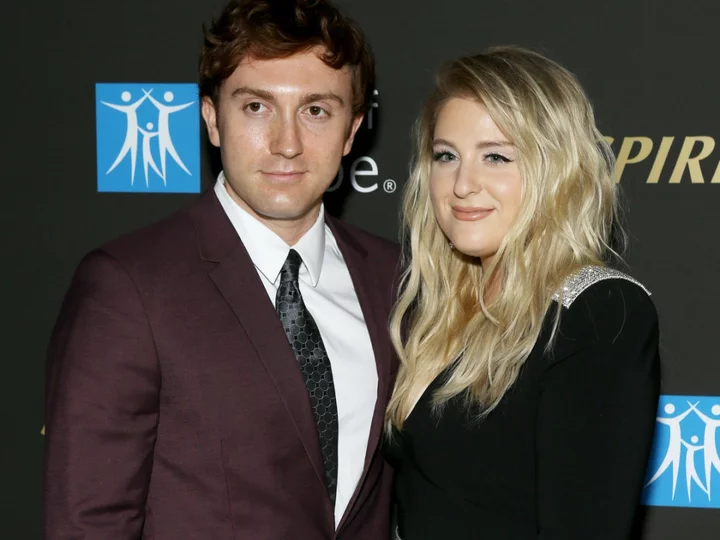
Meghan Trainor and husband Daryl Sabara welcome second child with unique name
Meghan Trainor and her husband Daryl Sabara have welcomed their second child, a son named Barry Bruce. Trainor, 29, and Sabara, 31, shared a joint post on Instagram on Tuesday to announce the baby news. In addition to their newborn, the pair are also parents to a two-year-old son, Riley. In the caption, Trainor revealed when the baby was born and formally introduced him. “On July 1st (our seven-year anniversary of our first date) we welcomed Barry Bruce Trainor into the world,” she wrote. She went on to share that she welcomed the infant via Caesarean section before thanking her medical team for their support. “He was a big boy at 8lbs 7oz...and sideways (transverse), but we had an amazing, successful C-section, and I finally got my skin to skin time!” the “Mother” singer wrote. “Thank you to all of the incredible doctors and nurses who took such great care of us.” The Instagram post included multiple photos of the newborn with his mother and father, along with snaps of the singer in a hospital bed. In the comments, fans and celebrities celebrated the baby news, with Paris Hilton writing: “Congratulations sis! So happy for you!” “Go Mama!! And welcome to the party, Barry!! What a lucky dude!” Mandy Moore added, while Gina Rodriguez wrote: “He is perfect!!! Congrats sweet superhero mama!!!” In January, Trainor revealed that she was pregnant with her second child when she confirmed the news in an interview with People. At the time, she said she was “ just so grateful [that she could] get pregnant”. “I’m crushing it. This is amazing,” she said in a statement to the magazine at the time. “This is my dream. I’m halfway there - I want four kids!” She went on to reflect on how her second pregnancy was different from her first. “It’s like a real pregnancy,” she said. “The first one was like make-believe. I had no symptoms with Riley to the point where I was like: ‘We need to go to the doctor. There’s nothing in me.’” Since then, Trainor has also opened up about how her first experience with childbirth impacted her mental health. In April, she revealed that she struggled with post traumatic stress disorder (PTSD) after welcoming Riley via Caesarean section. During an interview with Today, she said that after she’d had her child and returned from the hospital, there were times she felt like she was still in the delivery room. “I was like: ‘It’s so weird,’ to my therapist and my doctors,” the “Made You Look” singer recalled. “I was like: ‘It’s like I’m back in my room.’ At nighttime, when the pain would kick in. I was like: ‘Daryl, I’m still on the table, I know she’s inside me.’” Trainor said that the feeling, which went on for “months,” ultimately led to her diagnosis. “They were like: ‘So we have to work through this. That’s a sign of PTSD,’” she recalled. “And I was like: ‘Oh, I didn’t know that.’” PTSD is “a mental health condition that’s triggered by a terrifying event through either experiencing it or witnessing,” as noted by the Mayo Clinic. According to the Postpartum Support International, approximately “nine per cent of women” experience PTSD after childbirth Read More Meghan Trainor reveals the symptom that led to her postpartum PTSD diagnosis Meghan Trainor’s ‘big boy’ sex story with her husband is not what you think Meghan Trainor apologises for ‘careless’ teacher remark: ‘I’m so so sorry’ How to go sober if your partner still drinks The shared symptoms of menopause and young onset dementia Fiona Phillips Alzheimer’s diagnosis at 62: 7 ways to reduce your risk
1970-01-01 08:00

How to go sober if your partner still drinks
Jennifer Lopez has come under fire for launching and promoting her new alcohol brand, due to her husband Ben Affleck’s problems with alcoholism. The 53-year-old Let’s Get Loud singer, who had previously told InStyle that she abstains from caffeine and alcohol, took to Instagram following the announcement of her new liquor brand Delola, saying she enjoyed the “occasional cocktail” but did not drink to excess. Fans had been quick to criticise her, posting comments like, ‘Why not respect your husband’s sobriety?’ Her husband Ben Affleck, 50, has been candid about his struggles with alcoholism. In a 2020 New York Times interview, he shared: “It took me a long time to fundamentally, deeply, without a hint of doubt, admit to myself that I am an alcoholic… The next drink will not be different.” Affleck is sober, but seemingly, Lopez is not. “Going sober can be really difficult, especially if your partner drinks. There may be aspects of your drinking which they enjoy, so it’s quite common for people close to you, to say things which make it harder to go sober,” says Dr David McLaughlan, a visiting consultant psychiatrist for the Priory. So, how can you do it if your partner isn’t so keen? Consider what you will gain “Going sober might mean less drunken fallouts or arguments about incidents which occurred under the influence of alcohol. Avoiding hangovers also gives you back a lot more quality time together and more free cash to spend on things that matter to you,” says McLaughlan. If more sex and higher fertility are important to you, quitting the booze may help, perhaps helping to garner support from your partner too. “You might also notice increased libido and erectile function when you quit drinking. Even small amounts of alcohol reduce your fertility, so giving up will also increase your chances of falling pregnant together,” he explains. Find the right time to discuss it It may be a sensitive topic to dive into. “It is important when you go sober, that you find a time when your partner is calm, collected and willing to discuss a big change in your relationship,” says Phil Jackman, an addiction therapist at private rehab clinic Delamere. “Attempting to speak to them when they are stressed or busy may lead to unnecessary conflict. “Once you’ve found the right time, be honest with your partner and let them know the reasons you are giving up alcohol, and how this might impact your relationship. Hopefully, they will be supportive of your decision, but there might need to be a few things you need to work through first. “If you are with a partner that still likes a drink, try asking them if they can remove any alcohol from the house, or from a place you have access to it, so you aren’t tempted to give up on your sobriety,” he says. Don’t make unfair demands of them “Though it is fair to ask your partner to stop drinking and support you in sobriety, it is important that this is not a strict expectation of them. Assuming someone will automatically change their lifestyle just to suit yours may cause unnecessary conflict,” Jackman says. “Instead, when you make the decision to go sober, it’s important that you sit and talk through the reasons why you want to give up drinking, so they fully understand your decision. You may find they want to improve their own personal relationship with alcohol. However, it’s important to note, not everyone will be willing to do so. ” Seek out authenticity One of you quitting drinking could break a dangerous cycle. “If you and your partner regularly drink, more than just socialising with friends or during an occasion, your relationship could develop with a co-dependency to alcohol, where you are drinking to maintain the relationship,” says Dr Stefan Walters, Caba’s addiction specialist. “As humans, we can be highly influenced by peer pressure and the people around us. So, if we are socialising with those who drink heavily, we may feel a judgement for being sober, or that we are not joining in on the fun,” he explains. Pushing past that dependency will help you be authentic with your partner. “When you are sober, your personality is authentic, and you will feel emotionally present throughout conversations and experiences with your partner,” Walters adds. Find new things to do together If one of you does not drink, you may have to think outside the box about things you can do together. “If you are still feeling this way about the activities or hobbies after some time, I’d recommend speaking openly with your partner about adjusting or changing them,” says Walters. “Generally, you may feel that you’d rather take up healthier hobbies, like physical pursuits or mentally stimulating activities, instead of those centred around drinking, like quizzes or socialising at the pub. “So, it’s not necessarily about how to enjoy the same things, but working out how to spend time together through new activities that you both enjoy and receive emotional fulfilment from,” he explains. Going sober could help you find something new you love to do together. Read More Charity boss speaks out over ‘traumatic’ encounter with royal aide Ukraine war’s heaviest fight rages in east - follow live Fiona Phillips Alzheimer’s diagnosis at 62: 7 ways to reduce your risk 7 popular destinations that will soon be in London’s ULEZ Kate’s best Wimbledon looks, as she steps out in retro outfit for the tennis
1970-01-01 08:00
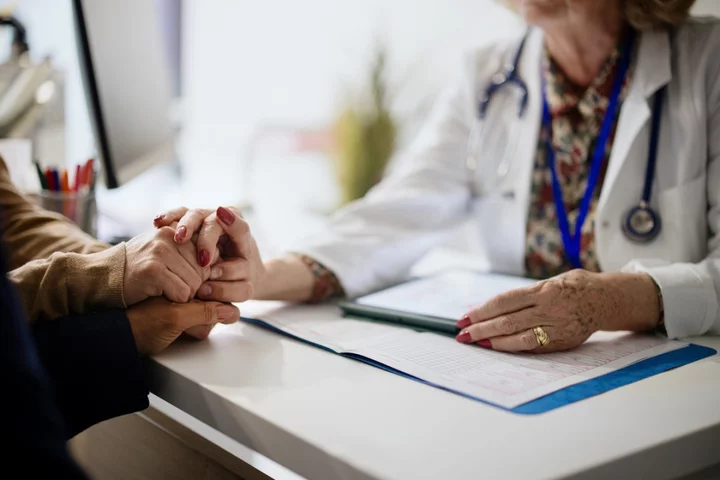
The shared symptoms of menopause and young onset dementia
Dementia UK and The Menopause Charity have published advice on the crossover symptoms of both young onset dementia and menopause, after former TV presenter Fiona Phillips disclosed her Alzheimer’s diagnosis. The shared symptoms mean that it is difficult for some women to spot the signs of dementia and Alzheimer’s, and instead mistake those symptoms for menopause. It comes as Phillips has revealed that she has been diagnosed with Alzheimer’s, the most common type of dementia, at the age of 62. The former breakfast TV presenter first noticed symptoms of “crippling anxiety” and “brain fog”, but since Phillips had not experienced this before, she and her family thought it might be menopausal symptoms. After undergoing Hormone Therapy Treatment (HRT) to alleviate her menopausal symptoms, Phillips’s brain fog remained. This prompted Phillips and her husband to seek further help, including months of cognitive tests before a lumbar puncture to assess spinal fluid revealed she had Alzheimer’s. Dementia is an umbrella term for a range of progressive conditions that affect the brain, while Alzheimer’s is a specific disease. Paul Edwards, Director of Clinical Services at Dementia UK, said in a statement that many people are unaware of the shared symptoms of the conditions. “For some women, dementia and Alzheimer’s symptoms may develop at the same time as the perimenopause or menopause which can bring additional challenges when it comes to seeking a diagnosis,” he explained. Dementia UK and The Menopause Charity have worked together to create an information leaflet on the similarities and differences between young onset dementia and menopause and perimenopause. While dementia is most common in people over the age of 65, an estimated 70,800 people in the UK are living with young onset dementia, where symptoms begin before 65. Common menopause symptoms include changes in periods, hot flashes, fatigue, mood changes, anxiety, stress, brain fog, vaginal dryness and more. Brain fog is a very common menopause symptom, and women often say that their brains feel like “cotton wool” while experiencing it. The symptom can make it difficult to recall words, complete multiple tasks or find themselves losing things. This can affect concentration, word-finding, memory and multitasking, impacting their emotions and overall well being day to day. Since these symptoms may also occur in dementia, some women become concerned that they are showing signs of young onset dementia. According to Dementia UK, though, brain fog is not typically the first symptom of dementia, so there are other initial signs to be aware of if you are concerned about dementia or Alzheimer’s. Early signs of dementia are more likely to be changes in vision and spatial awareness, language problems and changes in behaviour. It is typical that family members, friends and work colleagues may notice these changes first, often before the person themselves. Both Dementia UK and The Menopause Charity advise that because it is difficult to know what these symptoms are being caused by, it is important to see a GP to address any concerns. For more information, you can access an information leaflet produced by both charities here. If you would like to speak to a dementia specialist Admiral Nurse about young onset dementia and perimenopause or menopause, or any other aspect of dementia, can call our free Helpline on 0800 888 6678 or by emailing helpline@dementiauk.org. Read More Fiona Phillips, 62, reveals she has Alzheimer’s disease Fiona Phillips explains why she hid Alzheimer’s diagnosis from her children Woman exits plane after tirade about passenger who is ‘not real’: ‘Final Destination vibes’ Fiona Phillips Alzheimer’s diagnosis at 62: 7 ways to reduce your risk Fiona Phillips explains why she hid Alzheimer’s diagnosis from her children Fiona Phillips, 62, reveals she has Alzheimer’s disease
1970-01-01 08:00
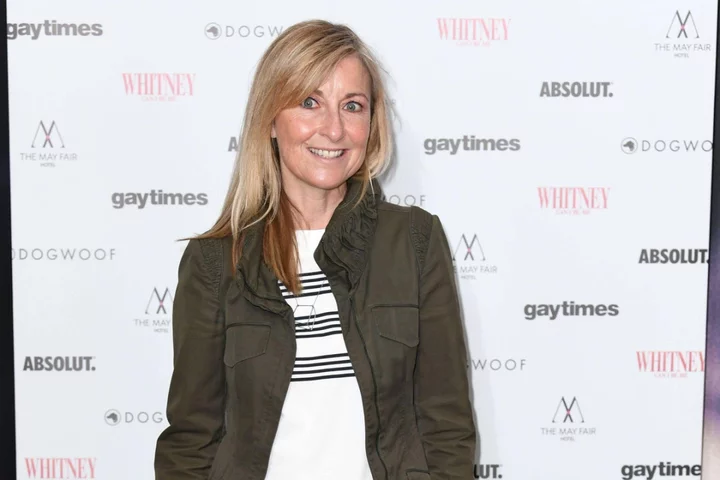
Fiona Phillips Alzheimer’s diagnosis at 62: 7 ways to reduce your risk
TV presenter Fiona Phillips has revealed she has been diagnosed with Alzheimer’s disease at the age of 62. The presenter and Daily Mirror columnist said the disease has “ravaged” her family and she had long feared being given the diagnosis. According to the Mirror, Phillips was diagnosed more than a year ago and is undergoing trials for a new drug that could slow the effects of the disease. Phillips, who is an Alzheimer’s Society ambassador, told the Mirror: “This disease has ravaged my family and now it has come for me. “And all over the country there are people of all different ages whose lives are being affected by it – it’s heartbreaking. “I just hope I can help find a cure which might make things better for others in the future.” As well as her column in the national newspaper, Phillips anchored GMTV for more than a decade from 1997. She also competed in the BBC’s Strictly Come Dancing in 2005. She is married to Martin Frizell, editor of ITV’s flagship programme Good Morning Britain. Phillips told the Mirror that, despite fearing she would one day be diagnosed with Alzheimer’s, the news was still a “gut-punching, shuddering shock”. The presenter said she feels “more angry than anything else” due to the disease having already affected her family life. “My poor mum was crippled with it, then my dad, my grandparents, my uncle. It just keeps coming back for us,” she said. Though she previously kept the news private, Phillips said she has decided to share her story to help end the stigma around Alzheimer’s. “There is still an issue with this disease that the public thinks of old people, bending over a stick, talking to themselves,” she said. “But I’m still here, getting out and about, meeting friends for coffee, going for dinner with Martin and walking every day.” She is taking part in clinical trials at University College Hospital in London, which aim to revolutionise future treatment. Hilary Evans, chief executive of Alzheimer’s Research UK, said: “We’re sending our love and support to Fiona and her family following her announcement that she’s living with Alzheimer’s disease. “Fiona’s been a friend of Alzheimer’s Research UK for well over a decade, and her support has shone such a valuable spotlight on the importance of research in overcoming the diseases that cause dementia. “There are around 70,800 people with dementia in the UK who, like Fiona, are under 65 and we’re determined to find a cure to end the heartbreak it causes.” It is thought at least five in every 100 people with Alzheimer’s are under 65. Though this figure may be higher, as it can be more difficult to get an accurate diagnosis at a younger age. So, is there anything you can actually do to help prevent dementia? 1. Stop drinking fizzy drinks Drinking too much coke or lemonade could increase your chances of developing dementia. People who consume the highest amounts of ultra-processed foods, like fizzy drinks and chocolate, may have a higher risk of developing dementia than those who eat the lowest amounts, a study by Huiping Li, of Tianjin Medical University in China, published in the Neurology journal, has indicated. 2. Say no to UPFs Sadly, lots of our go-to ingredients like sausages, ketchup and baked beans are highly processed, making them a risk-factor if consumed too frequently. Li, the author of the study, said: “These foods may also contain food additives, or molecules from packaging or produced during heating, all of which have been shown in other studies to have negative effects on thinking and memory skills. “Our research not only found that ultra-processed foods are associated with an increased risk of dementia, it found replacing them with healthy options may decrease dementia risk.” 3. Reduce your treats Too much chocolate and things like biscuits aren’t good for you, because they are highly processed and sugary. In fact, according to the study, for every 10% increase in daily intake of ultra-processed foods, people had a 25% higher risk of dementia. So, even just having a few extra biscuits or chocolates at work each day can heighten your risk. 4. Keep moving We all know being slumped at a desk, staring at a screen all day, isn’t great for your health, but it turns out sedentary jobs actually increase your risk of getting dementia. Dr Sara Imarisio, head of strategic initiatives at Alzheimer’s Research UK, said: “Our brains are incredibly complex, responsible for our memory, as well as what we think, feel and do. “Keeping our brains healthy as we age can help stave off diseases like Alzheimer’s, which physically attack brain cells, tearing away at the very essence of who we are. “We know that being physically and socially active can help us feel happier, healthier and more positive in general. “Lifting weights and running marathons aren’t for everyone, but there are many ways that we can stay physically active in our lives.” Noting more research published in the Neurology Journal, by Huan Song of Sichuan University in China, Imarisio continued: “This self-reported study adds to evidence that finding something you can stick to, that keeps you physically and socially active, is likely to have the greatest benefit to your health, rather than the activity itself. “The researchers found that even people with a high genetic risk for Alzheimer’s, the most common cause of dementia, could benefit from keeping physically active.” 5. Make an effort to see family and friends Social interaction is a really important way to keep your brain sharp and reduce your risk of dementia. If you avoid it, you are risking your health. According to Song’s research, people who were highly engaged in activity patterns, including frequent exercise and daily visits of family and friends, had 35% and 15% lower risk respectively, compared with people who were the least engaged. 6. Do the chores According to the same study, carrying out household chores is associated with a 21% reduced risk of dementia. Perhaps just increasing your brain activity a little, even just by washing up or changing your sheets, can help keep your mind active. 7. Play an instrument According to several studies, musicians are 64% less likely to develop mild cognitive impairment or dementia. So, if you’ve ever fancied playing the piano, guitar or ukulele, now’s the time – it’s never too late to learn something new. Read More Charity boss speaks out over ‘traumatic’ encounter with royal aide Ukraine war’s heaviest fight rages in east - follow live 7 popular destinations that will soon be in London’s ULEZ Kate’s best Wimbledon looks, as she steps out in retro outfit for the tennis How tennis could be harming your body – and why it does you good
1970-01-01 08:00
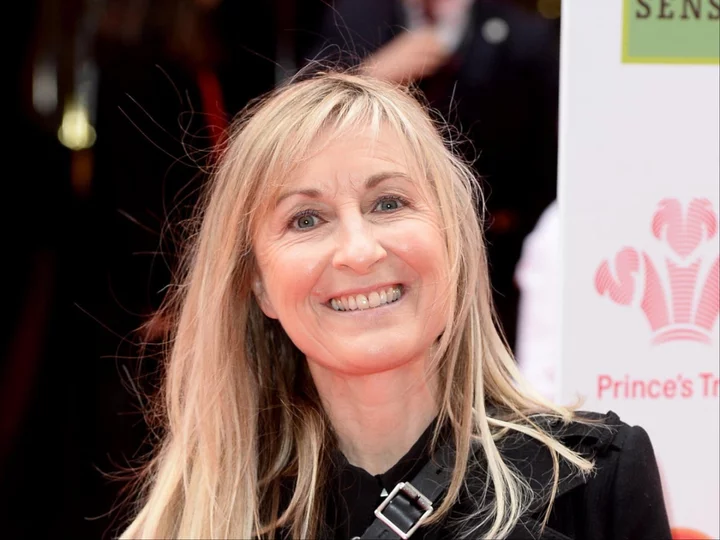
Fiona Phillips explains why she hid Alzheimer’s diagnosis from her children
Fiona Phillips has explained why she temporarily hid her Alzheimer’s diagnosis from her two sons. The former breakfast TV presenter, 62, was told she had the condition 18 months ago after she experienced symptoms of anxiety and brain fog, and has since disclosed her diagnosis to the public. Phillips, who is currently taking part in a drug trial that scientists hope could revolutionise the treatment of the incurable illness, said she was speaking out about her diagnosis in a bid to end the stigma surrounding Alzheimer’s. The journalist, best known for presenting the ITV Breakfast programme GMTV Today, toldThe Mirror that she was reluctant to tell her two sons, Nat, 24, and Mackenzie, 21 – who she shares with her husband, This Morning boss Martin Frizell – about her condition. “I just didn’t want to make a big thing out of it where we all sit down as a family and announce we’ve got something to tell them,” she said, “And I was worried they might be embarrassed in front of their friends or treat me in a different way. And it’s not like I’m doing anything out of character.” Phillips, who took part in BBC’s Strictly Come Dancing in 2005, shared that she and Frizell had blood tests to check whether their children could inherit the disease. “We wanted to know in case we needed to prepare the boys to make some difficult decisions later in life”, Frizell told the publication. “When the results came back as negative it was a huge moment – such an enormous sense of relief. There’s no Alzheimer’s on my side of the family and thank goodness it seems the boys have not inherited from Fiona’s side of the family.” The mother-of-two has now spoken out about the realities of the condition. “There is still an issue with this disease that the public thinks of old people, bending over a stick, talking to themselves,” Phillips said. The presenter said that she is no longer allowed to drive but walks each day: “I’m still here, getting out and about, meeting friends for coffee, going for dinner with [my husband] and walking every day.” The news comes as the Office for National Statistics said that dementia and Alzheimer’s disease were the leading cause of death in the UK in 2022. The couple began to notice something was wrong when she developed “crippling anxiety” towards the end of 2021. Since Phillips had not experienced this before, they thought it might be menopausal symptoms. “We got in touch with a menopause specialist who took her under their wing and put her on HRT but while that improved some symptoms, the brain fog remained,” Frizell said. This prompted the couple to seek further help, including months of cognitive tests before a lumbar puncture to assess spinal fluid revealed she had Alzheimer’s. Phillips is taking a new drug called Miridesap, which scientists hope could slow or even reverse the illness. The drug is administered three times a day with tiny needles and is being trialled by the University College Hospital (UCH) in London. Phillips has no idea if she is among the cohort reviewing a placebo or not but still believes that partaking in the trail is important for eventually finding a cure for the disease. “Even the people we see for the check ups don’t know if Fiona is on the real drug or a placebo,” Frizell said. “It’s been weeks now and I like to think her condition is stabilising but I am too close to know really, that could just be my wishful thinking.” Read More Fiona Phillips, 62, reveals she has Alzheimer’s disease Woman exits plane after tirade about passenger who is ‘not real’: ‘Final Destination vibes’ Jay-Z’s mother Gloria Carter ‘marries longtime partner Roxanne Wilshire’ Fiona Phillips, 62, reveals she has Alzheimer’s disease This is how Novak Djokovic is preparing to win Wimbledon How tennis could be harming your body – and why it does you good
1970-01-01 08:00
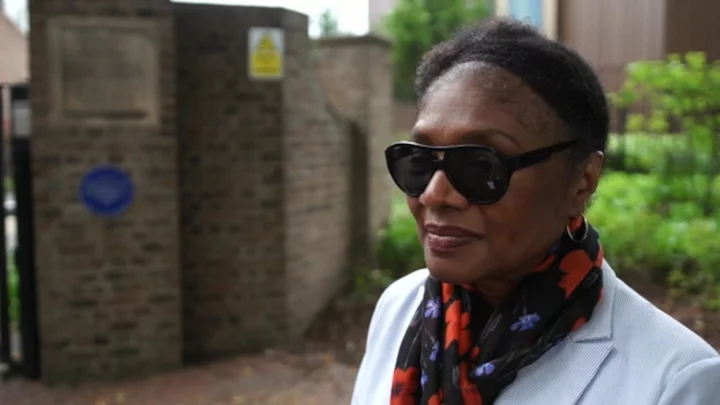
Six Triple Eight: The battalion of black women erased from history
The members of the 6888th battalion are beginning to get recognition almost 80 years on.
1970-01-01 08:00

NBA rumors: Trail Blazers don't want first player Heat offered for Damian Lillard
Damian Lillard reportedly prefers to be traded to the Miami Heat, but the Portland Trail Blazers are rumored to have no interest in getting this player in any return.Just when you thought the trade market in the NBA settled after Bradley Beal was dealt to the Phoenix Suns, there was a big name t...
1970-01-01 08:00

Why is Belarus admitting Wagner leader and backing Russia against Ukraine?
Belarus let Russian forces invade Ukraine from its territory and is now hosting its nuclear weapons.
1970-01-01 08:00

Ranking the 5 best players on the Heat if Damian Lillard trade happens
Damian Lillard has requested a trade from the Trail Blazers and the Miami Heat are one of his top destinations. The Miami Heat has been on the cusp of winning the NBA Championship over the last 4 seasons. They have made the Eastern Conference Finals three times and the NBA Finals twice.In bo...
1970-01-01 08:00
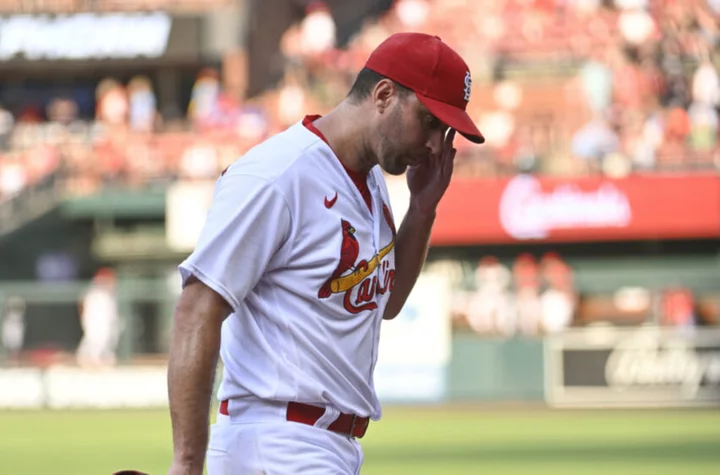
Cardinals vs. Marlins prediction and odds for Tuesday, July 4 (Fade Adam Wainwright)
The Miami Marlins picked up a series-opening win against the St. Louis Cardinals on Monday night, and now they have a chance to pick up their 50th win on the season on Tuesday.Miami has been one of the best surprises in Major League Baseball this season, featuring an impressive rotation of young...
1970-01-01 08:00

How tennis could be harming your body – and why it does you good
With Wimbledon underway and Nick Kyrgios already out due to injury, is tennis actually any good for you? Every tournament brings fresh injuries into the public eye, but the sport’s praises are often sung by fitness fans all over the world. So, how does it weigh up health and safety-wise? Is it worth investing some time in the sport if you enjoy Wimbledon? Tennis elbow The most common injury in tennis is tennis elbow, says Lucy Macdonald, physiotherapist at Octopus Clinic, and it’s something which has affected the likes of Andy Murray and Venus Williams. “Tennis elbow is the generic term for pain in the elbow, normally where irritation of the tendon runs over the elbow.,” she says. “It is often caused by a sudden overload on a tendon, in a way it is not used to, and it cannot cope with the forces that are on it. Treating it involves modifying what you are doing. “It can also be caused by other racket sports, and even things like breastfeeding a baby or cutting hedges and gardening,” she explains. But, it isn’t the end of tennis dreams. You can treat it. “Do not completely rest, modify the load going through the elbow, reduce the frequency and longevity of playing tennis, but things like physical support and tape can also help. “Changing your technique to take pressure off the tendon can help,” Macdonald explains. “The long-term treatment is to gradually build up the resilience of the tendon – a top spin stroke adds the most pressure – and alongside that, use static contractions – exercises that are just contracting the muscle, holding it and then relaxing.” Wrist injuries Kyrgios has pulled out of Wimbledon already, due to a wrist injury. “People may get wrist injuries if they fall and fracture the wrist. Or if they get a repetitive strain injury – if you use your wrist a lot in terms of the strokes you use with a lot of topspin – you can get some overuse and cause a flare up,” says Macdonald. Ankles and knees “Being on a slippery court, it can be easy to go over on your ankle,” she continues. “It happens in a lot of sports, if you’re running for a ball or trying to change direction. “You might get some knee problems, as they take such a hit generally with any propulsive sport – you get wear and tear on the knees, and sudden twists could impact your medial meniscus. Strength training is the best thing for that.” The benefits Should you be worried about all these injuries if you want to start playing, though? “The main cause of injuries in tennis is the sporadic nature people play it. If they suddenly go and play once every few months, the body is not used to the movements required in tennis, ” Macdonald notes.“You may suddenly run across the court and strain your calf or rupture your Achilles, because you haven’t run in months. “If you play it regularly and are consistent with the amount you play, it can be really beneficial,” she says.Any exercise is good, but the social aspect of tennis is hugely motivating, if you’re meeting up with three friends to play tennis, you have to show up – it gets you exercising regularly if you do it consistently. Tennis is beneficial for “increasing your heart and breathing rate, which is really good for your cardio and respiratory system. It keeps the range of motion in your shoulders, improves your balance with direction changes, and reduces your risk of falling,” says Macdonald. So, don’t let the risk of injury put you off. “There are so many positives that outweigh the negatives. Exercise, in general, extends your life span, and every illness out there is reduced by doing exercise. Even though it may have some impact on our musculoskeletal system, it is overwhelmingly positive for your mental and physical health.”
1970-01-01 08:00

Roundup: Nina Agdal, Logan Paul Engaged; Anthony Edwards Lands Huge Extension; Home Run Derby Contestants Revealed
Nina Agdal and Logan Paul are engaged, Anthony Edwards got a huge extension, MLB Home Run Derby contestants revealed and more in the Roundup.
1970-01-01 08:00
